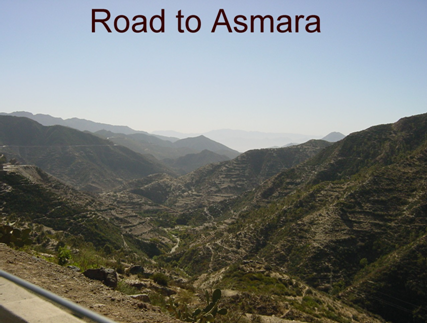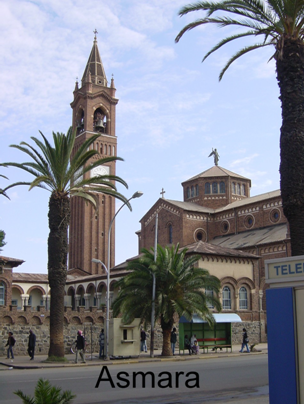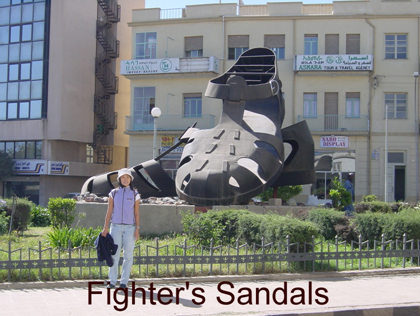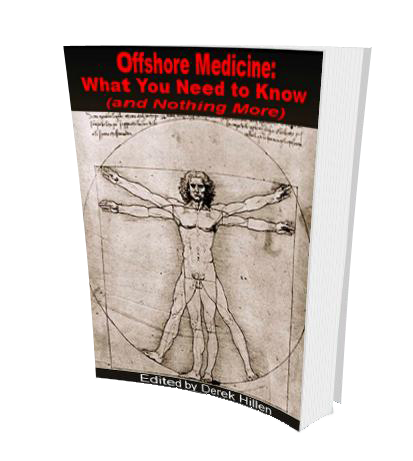- Boat
- Articles
- About
- Tehani-li Logs
- 2004
- Uligan Maldives
- Man, Oh Man, Oman
- Eritrea: The Nicest Place You’ve Never Heard Of
- Cruising Notes: Oman to Eritrea – From Pirates to Cappucinos
- Old Testament Sudan
- Egypt: Legend, Myth and Reality
- Thoughts on Cruising the Red Sea
- Greece: Civilization Again
- Montenegro
- Malta
- Sardinia, Italy
- Barcelona, Spain
- 2003
- 2002
- 2001
- 2004
- Contact
Cruising Notes: Oman to Eritrea – From Pirates to Cappucinos
The little country Eritrea is definitely a highlight of the Red Sea experience. We spent a month there and thoroughly enjoyed every minute of it. Our journey took us north through “The Gates of Hell,” or Bab al Mandeb, after leaving Salalah, Oman. We crossed through “Pirate Alley” (E 46.30 – E 49.30) off the coast of Yemen without incident. Some boats chose to go in convoy, we chose not to.
We kept 40 miles plus off the Yemeni coast and only encountered fishermen in fast open boats 40 feet long with twin 40 hp outboards. They really zoom so you can’t avoid them. Some will come up to you and ask for the usual booze and ciggies. Not impressed with the stale crackers I offered, they buggered off and we were bothered no longer.
Remember, if you do give anything then any and all yachts behind you are future prey. I also don’t like boats coming up to me in the open sea close enough for them to crash into my topsides so I can give them things; just our policy. As for pirates, we chose to stay offshore and obviously keep as far from Somalia as possible.
If you go inshore along the Yemeni coast you will have more encounters with fishermen, fishing floats and nets and the hostile Yemeni coast guard. For a shorthanded crew like ourselves pirates were enough to deal with, thank you. We left Salalah when there was no moon for maximum invisibility. We crossed the danger zone over a period of two very dark nights and one quick day.
We obviously did not run with any lights whatsoever and I had the radar screen covered in the cockpit. Two hours before dawn on both days I would change course 20 degrees. I figured if I were a pirate I would attack with the sun rising behind me and yachts have often been hit at first light after being followed in the dark for a while. We also understand that most of the attacks have been from slow, diesel-powered lifeboats ferrying refugees from Somalia to Yemen. They do not have radar so a significant course change on a dark night from a dark boat should be effective. You get the idea.
Having read many stories from those who came before us about going through the Straits of Bab al Mandeb into the Red Sea (many of those articles in the SSCA) we figured we would take no chances. I triple-reefed the main and had no other sails up. Considering we had NO WIND AT ALL through the whole Gulf of Aden since leaving Oman 4 days previous, how bad could it be? Wrong question! We entered the straits at lunchtime with 20 knots astern, very nice.
That built to 30, then 35 gusting 40. Still OK with the deeply reefed main. When it got dark we had 40 gusting 50 and that was too much. The seas built into steep brick walls with the occasional one coming on board to say hello. We brought the main down (not fun at 40+ knots in the middle of the night – the Selden sail cars paid for themselves then) and we sailed the rest of the night under bare poles doing 7 knots.
It was a bit bouncy and wet and we had lots of shipping to contend with, of course. In fact, it was the first night both of us needed to be in the cockpit at the same time to keep things under control. And this blast of wind lasted 100 miles! Boats that went before and those who came a day after had much more benign conditions averaging 30 knots of wind from astern. It just goes to show even when you think you are all prepared – you really aren’t! With that wind propelling us like the Space Shuttle we flew past the first port of Assab and went straight to Massawa, the main port for Eritrea.

The cruising guide for the Red Sea, the excellent “Red Sea Pilot,” (buy a copy, don’t steal it) says that when entering Massawa you must tie up on the cement wharf to check in. If you radio port control 2 miles out they will tell you the same thing. We don’t tie up to strange wharfs in industrial ports so we anchored just off the quay and dinghied in for check in. No problem at all.
They do not come out to the boat at all during check in. Others did this as well. The officials do want to see the boat when you leave, however. This is to check for Eritrean stowaways. (For more on the grim reality of being Eritrean see our other posts). After formalities you are issued a 48 hour shore pass and are free to move the boat to the yacht anchorage which is on a course of about 250 degrees magnetic. Keep the anchored fishing boats to port and you may come to two sets of huge yellow metal barges.
Go in between them or keep them to port as well and you will enter a great anchorage with 360 degree protection, no swell and terrific mud holding at 6-7 meters. It is very shallow on the port side coming in so keep to starboard. Dinghy tie-up was at the fishing dock. If you go there beware there is a BIG shallow area right in front of it so go to the anchored fishing boats (mostly from Egypt) and then cut back to the right to the dock.
hey closed the dock to yachties while we were there and then you had to take the dink all the way back to where you originally checked in – a long way. You won’t row it against the afternoon breeze so make sure the outboard is working well. If you stay longer than 48 hours or would like to leave Massawa, you must get a visa. This is easy and for Yanks it was only $30 each. Everyone else was charged $50.
This buys you a month. Be sure to go to the immigration office with any adults on board for the visa process as they need to sign the form in front of the immigration official. Nobody mentioned this to me and I had to go all the way back to the boat for my wife. The ‘toing and froing’ of all the weirdly colorful characters in the chaotic office is most interesting. It reminds one of the Star Wars bar.
Everybody felt the people were wonderful and the best restaurant was “Eritrea Restaurant.” I know it was good because I ate there 12 times and only got sick twice. But one of those times might have been from the tasty “Asmara Beer,” which we hear from locals is not always fresh. Great eggs and very good oranges can be had from the market behind the good little supermarket, “Bella Vista.”
The best cappuccinos were at the Dhalak Hotel. Massawa is a port town in every sense of the word and it is packed with sleazy bars. Again, the people are all very friendly and the only danger would seem to be from the women. A note to the single men, beware of the ‘enthusiastic amateurs!’

We highly recommend a trip to the pretty capital, Asmara, nestled high up in the mountains. Massawa is interesting with all the bombed out buildings but the scenic mountain trip up to Asmara, with its beautiful Italian architecture, sidewalk cafes serving 20 cent cappuccinos and the best pizza you have ever eaten (try “The Spaghetti and Pizza House” on Harnet Ave) makes you think you are on a different continent. You can get there by local bus for less than $1 for the 3.5 hour ride or take a taxi for $30 each way.
We liked Asmara so much we went twice. We stayed the first time in the Sunshine Hotel for $60 a night – a total rip-off for a two and a half star job and off the beaten track as well. The second trip we stayed in the Ambassador Hotel – of equal quality for only $21 a night and it was right downtown where you want to be. There are plenty of pensions for $10 or so with rickety beds and shared dubious bathrooms as well. “ZARA” is the bar to see.
Go there for a drink and talk to the owner, Ben, an American Eritrean fellow 30 years old. Wise well beyond his years, he is eager to meet yachties and will give you the lowdown on Eritrea. It was fascinating conversation and a real education.
The best restaurant in town, “the Blue Nile,” is right next door. You can get really good local food or a great steak for just a couple of dollars. In front of the restaurant is a huge metal sculpture of a pair of “Fighter’s Sandals,” the symbol of the 30 year “Struggle for Independence.”

You can get your Egyptian visa while in Asmara as well. The embassy staff bend over backwards to help and can issue it in one day if you ask them nicely. Bring a photo and $13 (cheap) at 10 AM and come back at 3 PM. Done. But make sure you get a three month window for your one month visa. Ariel got three months but I only got two! No reason.
Asmara has limited good provisioning with great cheeses and salamis. My wife points out that after cruising the Muslim world for so long Eritrea is a breath of fresh air for women. Here you are treated like a human being again and people will even listen when you talk. Despite the Italian influence, however, you will not see men and women holding hands. Men and men, yes but with women no.
They are very shy people so do not point a camera at anybody. They do not like it and will turn away. This holds true for children too! In one small town we were being pestered by two kids to buy a pot or something so I pulled out my camera and they ran. Great stuff. Interesting factoid; Eritrea was the last country in the world to get the internet and connection times are unbelievably slow. It is faster to write a letter.
You can get parts shipped in by DHL with ZERO duty in Eritrea. We found the service good; three days from Europe, one week from the US. There is a DHL office in Massawa.
Lastly, Mike is the agent. An older Eritrean gentleman who will find you, he is completely trustworthy. We dealt with him everyday for a month and were extremely pleased with him. Honest as the day is long, we were invited to his house on several occasions to have traditional Eritrean coffee made on a charcoal brazier by his wife, Ababa.
This must have been the way coffee was first made when it was discovered in Ethiopia just after Lucy was born. Eritrea is a don’t-miss stop on the Red Sea trek.

